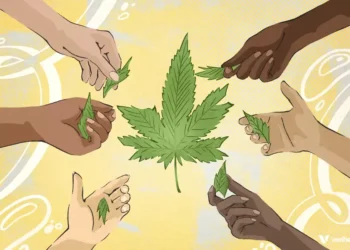The legalization of marijuana in Brazil is a topic that has been gaining more and more prominence in social, political, and economic debates. This subject polarizes opinions, generating heated discussions about the benefits and challenges that legalization could bring to the country. While some argue that legalization could bring numerous benefits, such as reducing crime and increasing tax revenues, others point to concerns about public health and the possible normalization of drug use.
In this article, we will explore the current situation of marijuana in Brazil, the possible consequences of legalization, examples of other countries that have already legalized marijuana use, and the social, economic, and public health implications that this decision could bring.

The Current Situation of Marijuana in Brazil
Currently, marijuana is illegal in Brazil for recreational purposes, although its medicinal use is allowed under certain circumstances. The 2006 Drug Law (Law No. 11,343) decriminalized the use of drugs for personal consumption, but the possession and cultivation of marijuana are still considered crimes. The law provides alternative penalties, such as rehabilitation treatment for users, while traffickers face harsher penalties, including long prison terms.
Despite these legal restrictions, marijuana use is quite widespread in various parts of the country. Millions of Brazilians use the substance for both recreational and medicinal purposes. This complex reality raises several questions about the effectiveness of current laws and the need for a reform in drug policy in Brazil.

The Debate Over Marijuana Legalization
The legalization of marijuana in Brazil is a topic that divides opinions. On one side are the proponents of legalization, who believe that this measure could bring significant economic and social benefits. On the other side are those who believe that legalization could lead to an increase in drug use and public health problems.
Arguments in Favor of Legalization
Among the arguments in favor of marijuana legalization in Brazil, the following stand out:
Crime Reduction: Many proponents of legalization believe that regulating marijuana could help reduce crime, especially related to drug trafficking. With legalization, the illegal market would be weakened, reducing the power of organized crime groups.
Increased Tax Revenue: Legalization could generate a new source of revenue for the government through taxes on the sale of marijuana. This revenue could be used to fund health, education, and public safety programs.
Medicinal Benefits: Marijuana has medicinal properties that are recognized in various scientific studies. Its legalization would facilitate access to cannabis-based treatments for diseases such as epilepsy, chronic pain, multiple sclerosis, and many others.
Regulation and Quality Control: Legalization would allow for the creation of a regulated market, ensuring the quality and safety of cannabis-based products. This would prevent consumers from being exposed to adulterated or dangerous substances.
Arguments Against Legalization
On the other hand, the arguments against marijuana legalization in Brazil include:
Public Health Risks: One of the biggest concerns of critics of legalization is the potential increase in marijuana use, which could result in a rise in cases of dependence and mental health issues, such as anxiety and depression.
Impact on Youth: Legalization could send the wrong message to young people, leading to the perception that drug use is normal and acceptable, which could increase use among teenagers and young adults.
Difficulty in Regulation: Some believe that marijuana legalization could be difficult to regulate effectively, leading to the emergence of a parallel, unregulated market.
Buy your Grow: Kit Cultivo Indoor
International Experiences with Marijuana Legalization
To better understand the possible consequences of marijuana legalization in Brazil, it is important to look at the examples of other countries that have already gone through this experience. Uruguay, Canada, and several states in the United States are examples of places where marijuana has been legalized and regulated.
Uruguay
Uruguay was the first country in the world to fully legalize marijuana for recreational use in 2013. The government controls the production and sale of marijuana, and citizens can buy the substance in authorized pharmacies. So far, Uruguay’s experience has been largely positive in terms of reducing trafficking and increasing tax revenues.
Canada
In Canada, marijuana was legalized for recreational use in 2018. The country created a regulated market that includes both state and private producers. Legalization brought a significant decrease in the illegal drug market and generated billions of dollars in tax revenue. However, marijuana use among young people remains a concern.
United States
In the United States, legalization varies from state to state. Some, like Colorado and California, have fully legalized the recreational use of marijuana, while others allow only medicinal use. The results in the states that legalized marijuana have shown a reduction in the number of drug-related arrests and an increase in tax revenues. However, the issue of public health and teenage use continues to be debated.
Economic Impacts of Marijuana Legalization in Brazil
The legalization of marijuana in Brazil could have a significant economic impact. It is estimated that the country could raise billions of reais annually in taxes if it regulated the cannabis market. In addition, legalization could generate thousands of direct and indirect jobs, from cultivation to the commercialization of the substance.
Companies could be created for the cultivation and sale of marijuana, as well as industries for derivative products, such as oils, foods, and cannabis-based cosmetics. Regulation would also open doors for foreign investment in the sector, potentially making Brazil a global leader in cannabis production.
Social Implications of Legalization
In addition to the economic impacts, marijuana legalization in Brazil would have several social implications. First, decriminalizing personal use could decrease the number of people imprisoned for drug-related crimes, which, in turn, would help alleviate prison overcrowding.
Second, legalization could help reduce the social stigma associated with marijuana use. This could encourage users to seek help and treatment, if necessary, without fear of legal repercussions.
Challenges in Implementing Legalization
While marijuana legalization in Brazil has many potential benefits, it also presents significant challenges. One of the biggest hurdles would be creating an effective regulatory framework to control the production, distribution, and sale of marijuana.
Furthermore, it is necessary to invest in public education campaigns to raise awareness about the risks and benefits of marijuana, ensuring that legalization does not lead to an indiscriminate increase in use.
Possible Regulatory Models
If Brazil opts for marijuana legalization, there are several regulatory models that could be considered:
State Model: Similar to Uruguay, where the government controls the entire production chain, from cultivation to sale.
Private Model with Government Regulation: Like in Canada, where private companies can produce and sell marijuana under strict government controls.
Mixed Model: A combination of the two previous models, allowing both state and private production.
The Importance of an Open and Informed Discussion
For marijuana legalization in Brazil to be successful, it is essential that the topic is discussed openly and informedly. It is necessary to listen to experts in health, economics, public safety, and the general population to build a consensus on the way forward.
Conclusion
The legalization of marijuana in Brazil is a complex and multifaceted issue that involves questions of public health, safety, economics, and social justice. While there are many valid arguments on both sides, it is clear that the country’s current drug policy needs reform. Learning from the experiences of other countries, carefully considering the potential benefits and risks, will be crucial in determining the best path for Brazil.
The decision to legalize or not legalize marijuana should not be taken lightly. Regardless of the outcome, it is essential to ensure that any policy implemented prioritizes the well-being and safety of the population while respecting individual rights and promoting social justice.
Read More: Camara dos Deputados
Read More Article: Cannabis Legalization Around The World







